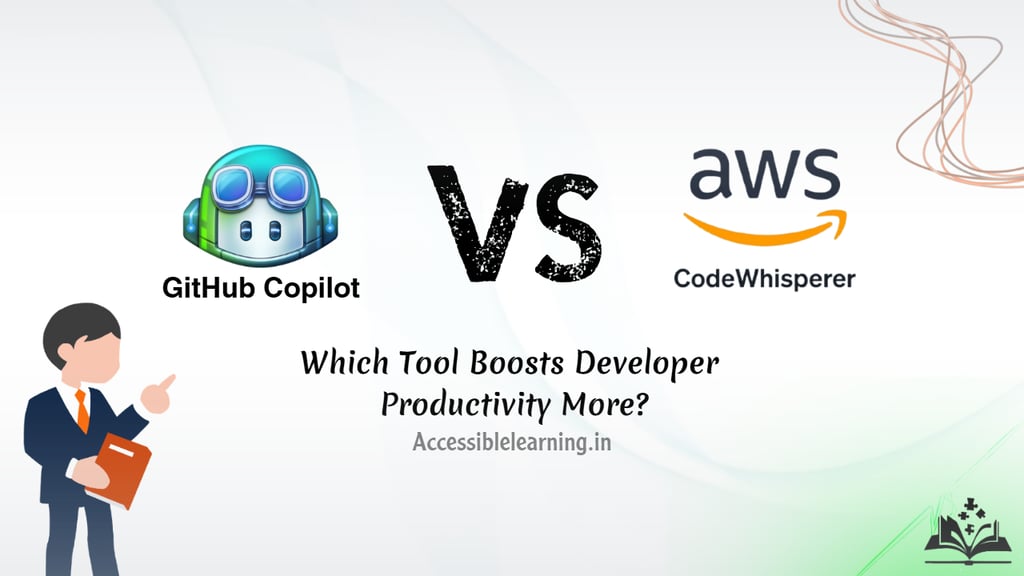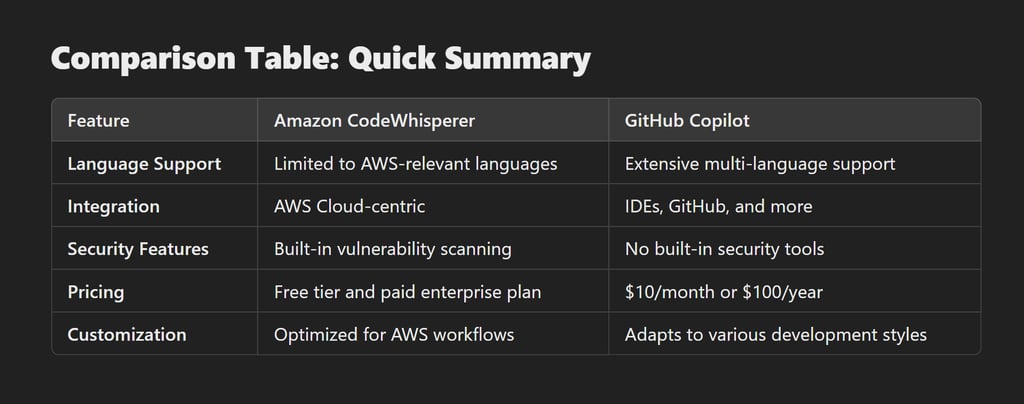
AI Coding Revolution: CodeWhisperer vs. Copilot – Detailed Analysis?
Discover the ultimate comparison between Amazon CodeWhisperer and GitHub Copilot. Explore their features, use cases, pricing, and key differences to choose the best AI-powered coding assistant for your development needs.
AI ASSISTANTEDUCATION/KNOWLEDGEPROGRAMMINGAI/FUTURE
Sachin K Chaurasiya
11/28/20247 min read


Artificial intelligence (AI) has revolutionized software development, empowering developers with tools that enhance productivity and creativity. Among the frontrunners in AI-powered coding assistants are Amazon CodeWhisperer and GitHub Copilot. Both tools aim to streamline the coding process by offering smart code suggestions, debugging assistance, and language support. However, they differ significantly in features, integration, and target audience. In this in-depth guide, we’ll explore their capabilities, advantages, limitations, and use cases to help you decide which tool suits your needs.
What Are Amazon CodeWhisperer and GitHub Copilot?
Amazon CodeWhisperer is a context-aware coding assistant built specifically to streamline cloud-native development on AWS. Its features are optimized for applications utilizing AWS services like Lambda, DynamoDB, and S3. By prioritizing security and seamless integration, CodeWhisperer is a perfect fit for developers working within the AWS ecosystem.
GitHub Copilot, powered by OpenAI’s Codex model, is a general-purpose AI-powered coding assistant. It offers extensive language support and is designed for universal use cases across programming environments. Its deep integration with GitHub repositories and support for various integrated development environments (IDEs) make it suitable for developers working on a range of projects, from small web apps to enterprise software.
Overview of CodeWhisperer and Copilot
Amazon CodeWhisperer
Amazon CodeWhisperer is Amazon Web Services' (AWS) proprietary AI-driven coding assistant. Designed with cloud-native development in mind, it tightly integrates with AWS tools, focusing on helping developers build secure, scalable, and optimized applications for the AWS ecosystem. It is particularly popular among enterprises already leveraging AWS cloud infrastructure.
GitHub Copilot
GitHub Copilot, developed by GitHub and OpenAI, is a versatile AI coding assistant powered by OpenAI Codex. Known for its broad applicability, Copilot caters to a wide range of developers, from web developers to data scientists. Its extensive language support and integration with GitHub make it a go-to choice for developers working across different domains.
Feature-by-Feature Comparison
Language Support
CodeWhisperer: While primarily focused on AWS-related programming, CodeWhisperer supports popular languages like Python, Java, JavaScript, C#, and TypeScript. However, its language breadth is more limited compared to Copilot.
Copilot: With support for over 20 programming languages, including Python, JavaScript, Ruby, PHP, C++, Go, and more, Copilot is versatile and suitable for a wide array of applications.
Code Quality and Contextual Suggestions
CodeWhisperer: Provides contextual code suggestions tailored to AWS workflows. For instance, if you're working with AWS Lambda, it can suggest relevant snippets for handling specific AWS services like DynamoDB or S3.
Copilot: Offers context-aware suggestions based on your current coding environment. It analyzes your code structure, comments, and project context to provide precise recommendations, from simple functions to complex algorithms.
Integration with Ecosystems
CodeWhisperer: Fully optimized for AWS environments. It integrates seamlessly with tools like AWS Lambda, DynamoDB, S3, and EC2, making it ideal for developers deeply embedded in the AWS cloud ecosystem.
Copilot: While not tied to a specific cloud provider, Copilot integrates well with GitHub repositories, enabling developers to leverage existing GitHub workflows. It also supports popular IDEs like Visual Studio Code, JetBrains, and Neovim.
Security and Compliance
CodeWhisperer: A standout feature of CodeWhisperer is its built-in security scanning, which helps identify vulnerabilities, ensure secure coding practices, and flag potential license conflicts in open-source dependencies.
Copilot: While Copilot excels at generating code, it lacks a built-in vulnerability scanner. Developers are encouraged to use third-party tools for thorough security checks.
User Experience and Usability
CodeWhisperer: Provides an AWS-specific experience with features like auto-completion, security scanning, and AWS-relevant documentation embedded within the IDE. Its focus on cloud workflows makes it less suitable for general-purpose development.
Copilot: Focuses on ease of use for all developers, regardless of their tech stack. Its intuitive interface and ability to understand project context provide a smoother and more universal experience.
Pricing
CodeWhisperer
Free tier available for individual developers.
Paid version for enterprises, offering advanced features like security insights and team-based controls.
Copilot
Subscription-based pricing at $10/month or $100/year for individual developers.
Enterprise pricing plans available with advanced team collaboration features.
Unique Features of Each Tool
CodeWhisperer’s Strengths
Cloud-Centric Focus: Designed specifically for cloud-native development, making it the best choice for AWS-heavy projects.
Security Scanning: Built-in tools identify potential vulnerabilities and licensing issues, saving time during deployment.
Tailored Suggestions: Optimized for AWS services, offering context-aware snippets for tasks like configuring AWS Lambda or interacting with DynamoDB.
Copilot’s Strengths
Extensive Language Support: Its wide compatibility with programming languages makes it suitable for general-purpose coding and specialized tasks like data analysis.
Broad Use Case: Whether you’re building web apps, developing enterprise software, or experimenting with machine learning, Copilot adapts to your project.
Community-Driven: Leveraging GitHub’s vast repository data, Copilot delivers suggestions based on real-world code examples.

Real-World Use Cases
When to Use CodeWhisperer
Scenario 1: You’re building a serverless application on AWS Lambda and need assistance with API Gateway configurations.
Scenario 2: Your team prioritizes security, and you require real-time vulnerability detection during development.
Scenario 3: You work extensively with AWS SDKs and services like S3, DynamoDB, or CloudFormation.
When to Use Copilot
Scenario 1: You’re developing a front-end application in JavaScript or TypeScript and need suggestions for UI/UX logic.
Scenario 2: You’re working on a multi-language project that includes Python for data analysis and Go for backend microservices.
Scenario 3: Your team uses GitHub for project management, and you want seamless integration with your repositories.
Limitations to Consider
CodeWhisperer
Limited language and IDE support compared to Copilot.
Best suited for developers within the AWS ecosystem, making it less flexible for non-cloud-native projects.
Copilot
May generate code with minor bugs or inefficiencies, requiring developer oversight.
No built-in security scanning, necessitating external tools for vulnerability checks.
Advanced Features
CodeWhisperer
Custom AWS Service Suggestions: Offers tailored snippets for AWS services like Lambda, CloudWatch, or IAM configurations.
Security Intelligence: Automatically detects security vulnerabilities and licensing conflicts in third-party code.
Workflow Optimization: Helps developers optimize cloud-native workflows by integrating with the broader AWS ecosystem.
Copilot
Deep Learning Models: Powered by OpenAI Codex, trained on massive datasets, including GitHub’s repositories.
Code Translation: Converts code between programming languages, helping developers migrate projects more efficiently.
Learning Capability: Learns your programming style over time and suggests code snippets that align with your typical coding patterns.
Collaboration Features
CodeWhisperer: Limited collaboration capabilities, primarily geared toward individual developers or teams in AWS-centric projects.
Copilot: Integrates seamlessly with GitHub’s version control and collaboration tools. Teams can share, review, and manage AI-suggested code easily.
Real-Time Debugging
CodeWhisperer: Focuses more on cloud-specific tasks than debugging but can highlight areas in the code where security risks or AWS misconfigurations exist.
Copilot: Acts as a debugging partner by suggesting fixes for syntax errors, logic flaws, or incomplete code during development.


Additional Use Cases
For Cloud-Native Projects
CodeWhisperer dominates in this area. For example:
Automating AWS Lambda functions.
Writing scripts to manage S3 bucket permissions.
Generating secure configurations for serverless workflows.
For Enterprise and General Development
Copilot is more flexible:
Building large-scale web applications in frameworks like React or Angular.
Writing machine learning models in Python or R.
Developing backend services using Node.js, Go, or Ruby.
For Security-Conscious Developers
CodeWhisperer wins with its built-in vulnerability scanner, which is particularly useful in industries like finance, healthcare, or government sectors.
Productivity Impact
Speed of Development
Both tools significantly speed up development, reducing boilerplate code and repetitive tasks.
CodeWhisperer excels in environments where AWS infrastructure is heavily used, offering tailored suggestions that save time during cloud integrations.
Copilot, with its broader focus, helps developers save time across diverse scenarios, from front-end UI building to database interactions.
Developer Learning Curve
CodeWhisperer requires familiarity with AWS tools and workflows, making it more suited to experienced cloud developers.
Copilot is easy to adopt for beginners and experts alike due to its wide language support and intuitive suggestions.
Pricing: A Closer Look!
Amazon CodeWhisperer
Free Tier: Available for individual developers with limited features.
Enterprise Tier: Offers advanced capabilities, including security checks, team collaboration, and detailed usage insights.
GitHub Copilot
Individual Plan: $10/month or $100/year, offering all features for a single user.
Team and Enterprise Plans: Pricing varies based on team size and collaboration needs, with features like administrative control and priority support.
Challenges and Drawbacks
CodeWhisperer
AWS Dependency: Best suited for AWS-related projects, limiting its utility for developers outside this ecosystem.
Narrow Language Scope: Lacks support for less common programming languages or frameworks.
Copilot
Security Concerns: AI-generated code may unintentionally include errors, inefficiencies, or unverified snippets.
Over-reliance Risk: Developers may become too reliant on Copilot for basic tasks, potentially impacting their long-term skill development.
Pro Tips for Using CodeWhisperer and Copilot?!
Combine with Manual Reviews
Always validate AI-generated code, especially when handling sensitive operations like database queries or encryption.
Leverage Ecosystem Strengths
Use CodeWhisperer for cloud automation and AWS infrastructure optimization.
Use Copilot for multi-language projects and cross-platform app development.
Security First
For Copilot users, integrate third-party security tools like Snyk or Veracode to compensate for its lack of built-in security checks.
CodeWhisperer users should regularly update AWS SDKs and libraries to minimize vulnerabilities.


The Road Ahead
The future of AI-powered coding assistants looks promising:
Amazon CodeWhisperer is likely to expand its language support and add more advanced features tailored for enterprise users.
GitHub Copilot is expected to evolve with OpenAI’s advancements, potentially incorporating GPT-4-level intelligence to improve contextual understanding.
Both tools are shaping how developers write code, prioritize tasks, and innovate.
Future Developments
CodeWhisperer
Amazon is expected to expand CodeWhisperer’s capabilities with support for more languages and deeper AI-powered insights into cloud architecture. Its security-first approach is likely to remain a key differentiator.
Copilot
With OpenAI’s advancements in natural language processing, Copilot will likely become even more intuitive, offering smarter and more nuanced suggestions. GitHub’s vast repository ecosystem ensures its training data will remain diverse and updated.
Choosing between Amazon CodeWhisperer and GitHub Copilot depends on your project requirements:
CodeWhisperer: Perfect for developers deeply integrated with AWS services and those prioritizing security and cloud-native solutions.
Copilot: Best for versatile developers handling multi-language projects, collaborating via GitHub, or requiring extensive IDE support.
By understanding the strengths and limitations of each tool, developers can integrate these assistants into their workflows to maximize productivity, maintain quality, and focus on creative problem-solving. The rise of such tools signals a future where coding becomes faster, smarter, and more efficient.
Subscribe To Our Newsletter
All © Copyright reserved by Accessible-Learning Hub
| Terms & Conditions
Knowledge is power. Learn with Us. 📚


